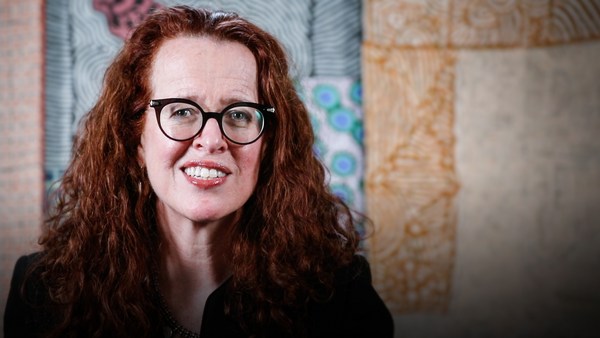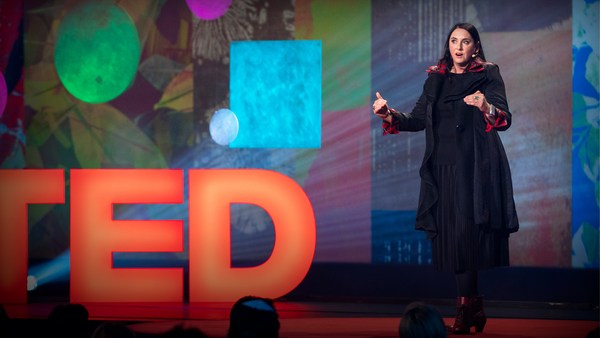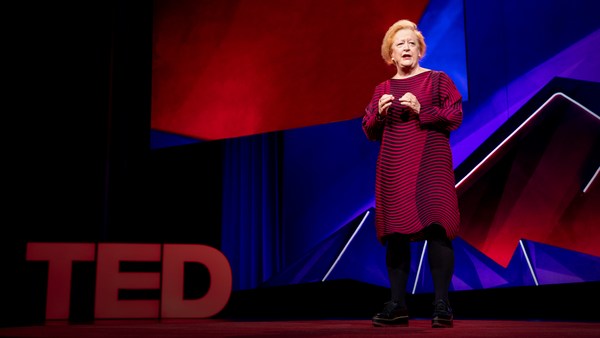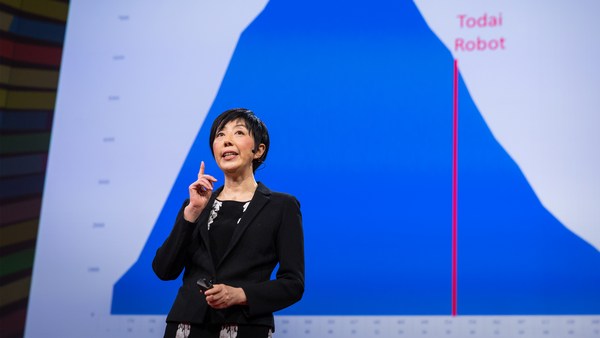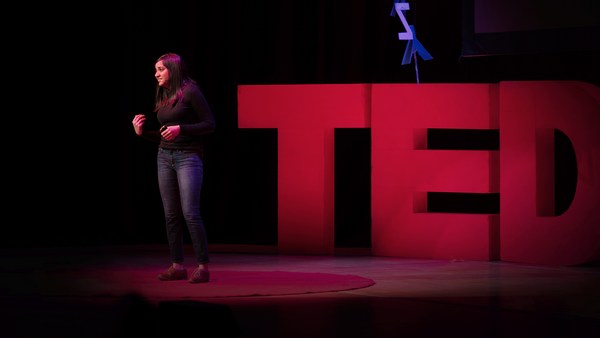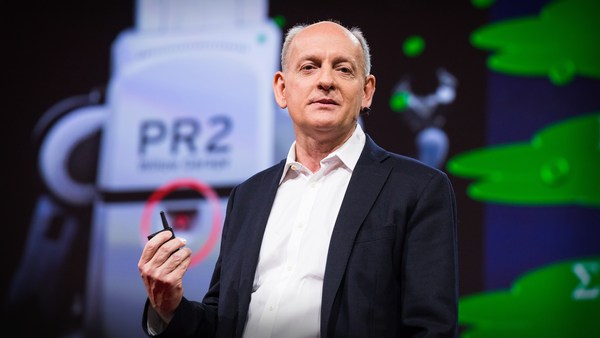I was in my mid-20s the first time I realized that I could be replaced by a robot. At the time, I was working as a financial reporter covering Wall Street and the stock market, and one day, I heard about this new AI reporting app. Basically, you just feed in some data, like a corporate financial report or a database of real estate listings, and the app would automatically strip out all the important parts, plug it into a news story and publish it, with no human input required.
Now, these AI reporting apps, they weren't going to win any Pulitzer Prizes, but they were shockingly effective. Major news organizations were already starting to use them, and one company said that its AI reporting app had been used to write 300 million news stories in a single year, which is slightly more than me and probably more than every human journalist on earth combined.
For the last few years, I've been researching this coming wave of AI and automation, and I've learned that what happened to me that day is happening to workers in all kinds of industries, no matter how seemingly prestigious or high-paid their jobs are. Doctors are learning that machine learning algorithms can now diagnose certain types of cancers more accurately than they can. Lawyers are going up against legal AIs that can spot issues in contracts with better precision than them. Recently at Google, they ran an experiment with an AI that trains neural networks -- essentially, a robot that makes other robots. And they found that these AI-trained neural networks were more accurate than the ones that their own human programmers had coded.
But the most disturbing thing I learned in my research is that we've been preparing for this automated future in exactly the wrong way. For years, the conventional wisdom has been that if technology is the future, then we need to get as close to the technology as possible. We told people to learn to code and to study hard skills like data science, engineering and math, because all those soft skills people, those artists and writers and philosophers, they were just going to end up serving coffee to our robot overlords.
But what I learned was that essentially the opposite is true. Rather than trying to compete with machines, we should be trying to improve our human skills, the kinds of things that only people can do, things involving compassion and critical thinking and moral courage. And when we do our jobs, we should be trying to do them as humanely as possible. For me, that meant putting more of myself in my work. I stopped writing formulaic corporate earnings stories, and I started writing things that revealed more of my personality. I started a financial poetry series. I wrote profiles of quirky and interesting people on Wall Street like the barber who cuts people's hair at Goldman Sachs. I even convinced my editor to let me live like a billionaire for a day, wearing a 30,000 dollar watch and driving around in a Rolls Royce, flying in a private jet. Tough job, but someone's got to do it.
And I found that this new human approach to my job made me feel much more optimistic about my own future, because you can teach a robot to summarize the news or to write a headline that's going to get a lot of clicks from Google or Facebook, but you can't automate making someone laugh with a dumb limerick about the bond market or explaining what a collateralized debt obligation is to them without making them fall asleep. And as I researched more, I found so many more examples of people who had succeeded this way by refusing to compete with machines and instead making themselves more human.
Take Rus. Rus Garofalo is my accountant. He helps me with my taxes every year, and as you can probably tell from the photo, Rus is not a traditional accountant. He's a former standup comedian, and he brings his comedic sensibility to his work. I swear, I've had more fun talking about itemized deductions with Rus than at actual comedy shows that I've paid real money to see. Rus knows that in the age of TurboTax, the only way for human accountants to stay relevant is bringing something to the table other than tax expertise. So he started a company called Brass Taxes. Get it? He hired a bunch of other funny and personable accountants, and he started looking for clients in creative industries who would appreciate the value of having a human being walk them through their taxes.
Now, technically, I should be very worried about Rus, because tax preparation is a highly automation-prone industry. In fact, according to an Oxford University study, it has a 99 percent chance of being automated. But I'm not worried about Rus, because he's figured out a way to turn tax preparation from a chore into an entertaining human experience that lots of people, including me, are willing to pay for.
Or take Mitsuru Kawai. Sixty years ago, Mitsuru started as a junior trainee at a Toyota factory in Japan. He made car parts by hand. And this was the 1960s, an era where the auto industry was undergoing a huge technological transformation. The first factory robots had started coming onto the assembly lines, and a lot of people were worried that auto workers were going to become obsolete. Mitsuru decided to focus on what, in Japanese, is called "monozukuri" -- basically, human craftsmanship. He studied all the nuanced, intricate details of auto design, and he developed these kind of sixth-sense skills that few of his other colleagues had. He could listen to a machine and tell when it was about to break or look at a piece of metal and figure out what temperature it was just by what shade of orange it was glowing. Eventually, Mitsuru's bosses noticed that he had all these skills that his coworkers didn't, and they made him really valuable, because he could work alongside the robots filling in the gaps, doing the things that they couldn't do. He kept getting promoted and promoted, and just this year, Mitsuru Kawai was named Toyota's first-ever Chief Monozukuri Officer, in recognition of the 60 years that he spent teaching Toyota workers that even in a highly automated industry, their human skills still matter.
Or take Marcus Books. Marcus Books is a small, independent, Black-owned bookstore in my hometown of Oakland, California. It's a pretty amazing place. It's the oldest Black-owned bookstore in America, and for 60 years, it's been introducing Oaklanders to the work of people like Toni Morrison and Maya Angelou. But the most amazing thing about Marcus Books is that it's still here. So many independent bookstores have gone out of business in the last few decades because of Amazon or the internet.
So how did Marcus Books do it? Well, it's not because they have the lowest prices or the slickest e-commerce setup or the most optimized supply chain. It's because Marcus Books is so much more than a bookstore. It's a community gathering place, where generations of Oaklanders have gone to learn and grow. It's a safe place where Black customers know that they're not going to be followed around or patted down by a security guard. As Blanche Richardson, one of the owners of Marcus Books, told me, "It just has good vibes."
Earlier this year, Marcus Books temporarily closed, and like a lot of businesses, its future was uncertain. It was raising money through a GoFundMe page. And then George Floyd was killed. The streets filled with protests, and orders poured in to Marcus Books from all over the country -- first, a hundred books a day, then 200, then 300. Today, they're selling five times as many books as they were before the pandemic, and their GoFundMe page has raised more than 250,000 dollars. And if you look at the comments on its GoFundMe page, you can see why Marcus Books has survived all these years. One person wrote that we have a duty to preserve gems like this in our community. Someone else said, "I've been going to Marcus Books since I was a child, and Blanche Richardson showed me many kindnesses." "Gems." "Kindnesses." Those aren't words about technology. They're not even words about books. They're words about people. The thing that saved Marcus Books was how they made their customers feel: an experience, not a transaction.
If you, like me, sometimes worry about your own place in an automated future, you have a few options. You can try to compete with the machines. You can work long hours, you can turn yourself into a sleek, efficient productivity machine. Or you can focus on your humanity and doing the things that machines can't do, bringing all those human skills to bear on whatever your work is. If you're a doctor, you can work on your bedside manner so that your patients come to see you as their friend rather than just their medical provider. If you're a lawyer, you can work on your trial skills and your client interactions rather than just cranking out briefs and contracts all day. If you're a programmer, you can spend time with the people who actually use your products, figure out what their problems are and try to solve them, rather than just hitting next quarter's growth targets.
That's how we become futureproof. Not by taking on the machines, but by excelling in the areas where humans have a natural advantage. By living and working more like humans, we can make ourselves impossible to replace. And the good news is that we don't have to learn a single line of code or deploy a single algorithm. In fact, you already have everything you need.
Thank you.
